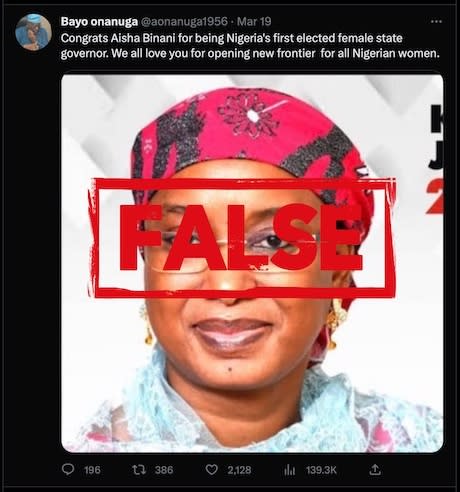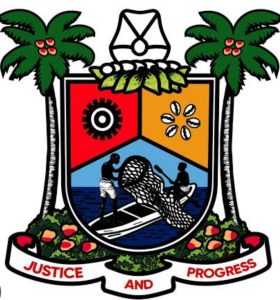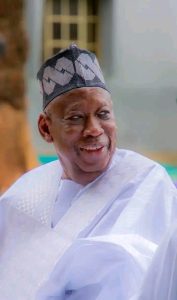Elections as Crime Scenes: The Adamawa Example By Owei Lakemfa
TWICE did I hear Aisha Dahiru, alias Binani, of the All Progressives Party, APC, declared the winner of the Adamawa State gubernatorial elections and the first female to be elected governor in the country. Twice did this turn out to be a hoax – a sick joke played on Nigerians. The first time was the product of propaganda; the diet on which Nigeria is run.
After the March 18, 2023, elections, it was announced on some media outlets the next day that Binani had won the elections. Many, including Great Britain, fell for the hoax. The British High Commissioner in Nigeria, Catriona Laing, took to her verified Twitter handle, screaming: “Great news! Huge congratulations to Aisha Binani! I hope you will be a trailblazer for other elected female governors.”
When the reality dawned on Laing that she had fallen victim to an orchestrated disinformation campaign, the envoy deleted her tweet. The facts were that the elections were inconclusive and Binani’s rival, incumbent Governor Umaru Ahmadu Fintiri of the Peoples’ Democratic Party, PDP, in the results so far declared, was actually leading with 421,524 to Binani’s 390,275. Despite these facts, the APC, perhaps based on false information from its Adamawa State branch, insisted that Binani had won the elections.
Its National Publicity Secretary, Felix Morka, issued a statement claiming that: “election results show a clear and decisive victory for Senator Aishatu Dahiru (Binani), the All Progressives Congress, APC, governorship candidate. Faced with the imminent and certain prospect of losing the election, thugs and political actors led by the incumbent governor and candidate of the PDP, Ahmadu Umaru Fintiri, have unleashed heavily armed thugs to disrupt further collation of results and subvert the will of the Adamawa people as expressed at the polls.”
The Harvard-trained lawyer and former human rights advocate claimed, without providing any evidence, that “the governor is reported to have torn result sheets at the collation centre in a show of unprecedented impunity and executive brigandage.” The APC insisted that Binani: “holds a clear, unassailable lead, only awaiting final collation and declaration by INEC.” However, the results with the INEC were contrary to the APC’s claims, and it directed that supplementary elections be conducted.
The supplementary elections were held on Saturday, April 15, and the results were being collated and announced when, at 1.00 a.m. the next day, with half the results declared, the INEC announced a break and that the collation and announcements would continue at 11.00 a.m. However, at 9.00 a.m., two hours before the exercise was to continue, Yunusa Hudu-Ari, the INEC Resident Electoral Commissioner, REC; Mohammed Barde, the Police Commissioner on election duty in the state wearing camouflage uniform, the State Director of the Directorate of State Services, DSS, and the head of the state’s Nigeria Security and Civil Defence Corps, wearing a well ironed uniform, returned to the collation venue.
REC Hudu-Ari, Commissioner of Police Mohammed Barde, and the other security chiefs who had militarised the collation centre were aware that the collation of the results was in progress and knew that only the Returning Officer, Professor Mohammed Mele, was empowered to announce the results and the winner of the elections. Despite these and the protests of representatives of political parties and election observers, the REC, backed by the security chiefs, went ahead to announce Binani as the winner of the elections. They then fled the crime scene with the assistance of well-armed policemen and security operatives. It was nothing short of an attempted electoral coup, and the action almost set the state on fire, with angry residents taking to the streets in search of the conspirators.
In a redeeming move, INEC quickly nullified the announcement and ordered the REC and its officials in the state to report to its headquarters in Abuja. Inspector General of Police, Usman Baba, followed by removing Barde and replacing him with his Gombe State colleague, Etim Equa.
On Tuesday, when the INEC concluded the collation and announcement of the supplementary election results, Fintiri was declared the winner. It was clear to me that the REC was aware that Binani had lost but had deliberately moved to declare her the winner. The move may seem bizarre, but not in Nigeria, where much crazier things happen in elections. For instance, the APC candidate in the 2019 Imo State gubernatorial elections, Hope Odidika Uzodinma, who came fourth in the INEC-supervised elections, was elevated on January 14, 2020, to the first position by no less an institution than the Supreme Court of Nigeria. In the 2023 elections, candidates who did not contest in the statutory primaries ran in the elections, with some of them declared elected.
The Adamawa coup attempt was a simple one. The strategy amongst the political class, is to get declared the winner of an election and let the court do the rest of the job. Even if the court were to rule in favour of the actual winner, the loser would have been in office for some time, even years before the actual winner would take over.
So, perhaps in accordance with the script, the REC illegally declared Binani the elected governor of Adamawa State. She immediately made an ‘acceptance’ speech carried on public network television, thanking President Muhammadu Buhari for her alleged victory as the first female governor. Next, she ran to the Federal High Court in Abuja to stop INEC from doing anything about her announced victory.
In court, she claimed the fake result that declared her the winner, is authentic, that INEC voiding the result announced by the REC is an usurpation of the power of the Returning Officer and that only the petition tribunal has the power to void her declaration as the governor-elect. Binani failed to acknowledge that it was not the Returning Officer that declared her winner, and since she claims it is only the election tribunal that has powers over electoral matters, why did she not head there rather than the High Court?
So why did Hudu-Ari, a lawyer, and his fellow conspirators engage in the attempted electoral coup? An alleged security officer in a viral video claimed they were paid N2 billion. But Binani, in a reaction, said this is false. Perhaps REC Yunusa Hudu-Ari would help clarify whether he staked his reputation, job, and freedom for free or was paid to do the job. But the problem is that he seems to have disappeared from the radar screen. However, one person who is certainly not on the run is the strong woman, Binani; she is ready for any eventuality.
So long as politics remains the most lucrative business in Nigeria and impunity reigns, it will be run like a criminal enterprise and our elections will be crime scenes to be trampled upon.







